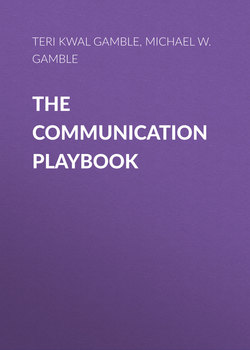Читать книгу The Communication Playbook - Teri Kwal Gamble - Страница 204
На сайте Литреса книга снята с продажи.
Naming Practices
ОглавлениеPsychologist Albert Mehrabian has studied reactions to unisex names. He notes that when a boy’s name catches on with girls, it usually loses favor as a name for boys. Historically, U.S. parents have felt free to choose androgynous names for girls. In contrast, some countries, like Finland, have official lists of boys’ names and girls’ names that parents must select from.46 Names often reflect fashion, taste, and culture. In Venezuela, for example, legislators introduced a bill that prohibited Venezuelan parents from giving their children names that exposed them to ridicule or were hard to pronounce in Spanish.47 In Thailand, children are given English nicknames like Pig, Money, Fat, and Seven because they are easier for foreigners to pronounce.48 In southern Africa, parents choose the names of children to convey a special meaning, rather than participate in the latest fad, as is common in the West. Names that translate as God Knows, Enough, Wind, and Rain are common in southern Africa.49 Alfred Mehrabian reports that people in the United States respond differently to different names, exhibiting more positive reactions to more common names.50
Ethics and Communication
The Words We Choose
Phrases we recall readily and words chosen to highlight reveal a lot about the words’ users. Consider the following:
The study “Sex Bias in the Newspaper Treatment of Male-Centered and Female-Centered News Stories” by K. G. Foreit and colleagues, published in 1980, revealed that a woman’s marital status was mentioned in 64% of the newspaper stories examined, whereas a man’s marital status was mentioned in only 12%. Have things changed today?
Pick up a copy of a current English-language newspaper or magazine or check online. Identify and count the number of male-centered and female-centered news stories in it. Also count the number of times the marital status of each person is referred to in each story. Have we made any progress?
Ethics and Communication
More Words We Choose
Phrases we recall readily and words chosen to highlight reveal a lot about the words’ users. Consider the following:
1 In Words That Work: It’s Not What You Say, It’s What People Hear, author, pollster, and media commentator Frank Luntz observes that “Great movie quotes become part of our cultural vocabulary.” For example, although they are from films made years ago, many of us still use the phrases “I’ll be back,” from The Terminator; “What we’ve got here is a failure to communicate,” from Cool Hand Luke; “You talking to me?” from Taxi Driver”; and “I’m mad as hell, and I’m not going to take it anymore,” from Network. Interestingly, each of these lines was spoken by a male character.
Similarly, ad slogans such as “I’m lovin’ it” (McDonald’s) and “Just do it” (Nike) are equally remembered and stick in our brains to be recalled forever.
What quotes from recent films do you think we will still be using in years to come? Why? How many were spoken by men? How many by women? What slogans do you expect to still reference in a decade?
2. In the book Slam Dunks and No-Brainers: Language in Your Life, The Media, Business, Politics and Like . . . Whatever, media critic Leslie Savan laments the growing use of pop language. Words and phrases such as “Don’t go there,” “Get over it,” “You’ve got that right,” “duh,” and “bling” constitute a new subdivision of English, projecting an attitude and a vocabulary derived from what we hear over and over in television programs and advertising. Because of the repetition, these terms click into place without their users needing to think, effectively turning those of us who use them into corporate pawns.
Do you think Savan is right? Is pop language use displacing more complex thinking? Keep count of the number of pop phrases that you and others use during a typical day. What words could have been spoken in their place that might have been more expressive of personal thoughts? Who uses pop language more, men or women?
